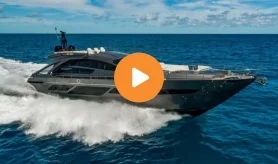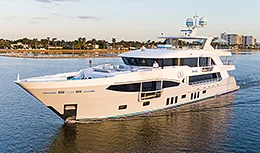- Alaskan Yachts
- Azimut Yachts
- Back Cove Yachts
- Beneteau Yachts
- Benetti Superyachts
- Bertram Yachts
- Boston Whaler
- Broward Yachts
- Buddy Davis Sportfish
- Burger Yachts
- Cabo Yachts
- Catamarans
- Carver Motoryachts
- Center Console
- Chris-Craft Yachts
- Cruisers Yachts
- DeFever Trawlers
- Dufour Sailboats
- Fairline Yachts
- Feadship Yachts
- Ferretti Yachts
- Formula Yachts
- Fountaine Pajot Cats
- Grady-White
- Grand Banks Trawlers
- Hargrave Yachts
- Hatteras Yachts
- Hinckley Picnic Boats
- Horizon Yachts
- Hydra-Sports
- Intrepid Boats
- Jarrett Bay Sportfish
- Jeanneau Yachts
- Kadey-Krogen Trawlers
- Lazzara Yachts
- Lekker Boats
- Luhrs Sportfish
- Marlow Yachts
- Maritimo Yachts
- Marquis Yachts
- McKinna Motoryachts
- Meridian Yachts
- Midnight Express
- MJM Yachts
- Mochi Craft
- Neptunus Motoryachts
- Nordhavn Trawlers
- Nordic Tugs
- Numarine Yachts
- Ocean Alexander Yachts
- Offshore Yachts
- Outer Reef
- Oyster Sailing Yachts
- Pacific Mariner Yachts
- Palmer Johnson Yachts
Bitcoin: The New Way to Buy Yachts
March 6, 2015 12:39 pm
Think of it kind of like email. Nobody owns or controls email from a central location, and it isn’t something you can hold in your hand, but we all consider it real, and we’re all able to use it as long as our computers can talk to one another.
Bitcoin shares those attributes. It’s a virtual currency, also known as a cryptocurrency, existing solely in cyberspace and controlled on a peer-to-peer basis. There’s no bank and no national treasury department in charge. Instead, user exchanges set the value of bitcoin against other currencies, similar to the way the value of the dollar fluctuates against the euro.
You can spend bitcoin like any other money via a mouse click or a cellphone app. Bitcoins flow from your digital wallet into the account of a retailer, just as dollars might flow digitally from your bank account into a store’s without you ever holding the printed $100 bill in your hand.
Is bitcoin Jetsons-level crazy? Maybe, but it’s also starting to look like more than a geek-fueled fad. While bitcoins are not the only form of cryptocurrency (ripple and litecoin are others), they appear poised to become the world’s first to go mainstream. Microsoft now accepts bitcoin for Windows and Xbox purchases. Overstock.com and Amazon.com take it. You can spend bitcoin at Home Depot, Kmart, CVS and Sears. Newport Beach Lamborghini in California recently sold a Tesla Model S electric sedan for the equivalent of about $100,000 in bitcoin.
BitPremier, the leading Bitcoin luxury marketplace, sold a villa in Bali, Indonesia, worth nearly $600,000 in what is believed to be the largest bitcoin purchase to date. Heck, if you want a private, $250,000 ride into space, you can pay Virgin Galactic with bitcoin too.
And about a year ago, in January 2014, the world’s first yacht charter was booked with bitcoin. It was small — a four-hour, $2,400 charter aboard a 54-foot Sea Ray in South Florida — but early adopters in the yachting community believe it was the start of something much, much bigger.
“I fully believe this currency is going to take off, and we’re just one of the first people accepting it,” says Jessica Londono-Sammett, a partner at The Advantaged Yacht Charter & Sales who booked that first bitcoin charter.
Bob Denison of Denison Yacht Sales agrees. In December 2014, his firm became the first large-scale yacht company to accept bitcoin for luxury charter bookings and boat sales at all price points, including multimillion-dollar deals. “One day,” he says, “you would charter a yacht with bitcoin, provision with bitcoin, pay for dockage in bitcoin and leave the crew gratuity in bitcoin.”
To those who say it sounds certifiably looney, he adds, “If you had asked your grandparents about something like a credit card 60 or 70 years ago, they would’ve thought you were crazy. This is the same thing.”
See Related: Use Bitcoin to Purchase and Charter Yachts
The Basics of Bitcoin
Bitcoin has been circulating in cyberspace since 2009. Each bitcoin is created by a machine the size of a hard drive that solves math puzzles and connects to a computer, a process known as bitcoin mining. That’s how Londono-Sammett got started using the virtual currency. Her husband was an Apple “genius” who talked her into mining bitcoin at home. In October 2013, she added it as a payment method at The Advantaged, putting the bitcoin logo on the company’s website right next to Visa, MasterCard and American Express.
“We went to the bitcoin conference last year, which was the first of its kind, and we started to get more excited about it,” she says. “That’s where we got our first charter.”
That conference included a presentation by the creator of Bitpay, a processing service that companies can use to accept bitcoins as currency. Bitpay puts itself in the middle of bitcoin transactions, charging a lower fee than banks or credit-card companies might charge. At the end of each business day, after accepting bitcoins as payment, companies like The Advantaged and Denison Yacht Sales can “cash out” their Bitpay accounts, converting bitcoins into the currency of their choice.
During the Bitpay presentation at the January 2014 conference, the owner mentioned that only four companies in Miami-Dade County accepted bitcoin. “We were one of the four at that time,” Londono-Sammett says. “He mentioned The Advantaged. Somebody called me the next day and booked the boat.”
Her second bitcoin charter booking came one month later, from hardcore bitcoin miners. “They have a warehouse full of those machines,” she says. “They happened to be in town on vacation, and they had an app that says who accepts bitcoin in the area. They weren’t necessarily looking for a charter, but they found us. They took the 39 Meridian.”
Denison came into the bitcoin universe differently. He had two clients — one from Europe, one from the U.S. West Coast — ask whether his firm accepted bitcoins in mid-2014. At the time, he was opening an HSBC multicurrency account, which lets clients put funds into Denison’s escrow account but remain in the native currency, so that during the 30- to 90-day process of buying a boat, there’s no worrying about exchange-rate fluctuations. As he was opening that HSBC account in Hong Kong, the bitcoin similarities clicked in his mind. “It’s just another one of those services that we offer,” he says today. “You have the option of accepting bitcoin if you wanted to, or you have the option of us exchanging it to your chosen currency.”
As of this writing, Denison had yet to complete a bitcoin charter or yacht sale, but he believes it will happen within the next few months.
“I would be surprised if we don’t have a bitcoin transaction by this summer,” he says. It’s a combination of a few things. There’s the growth in yachting activity on the West Coast of the United States, and the acceptance of bitcoin, people buying and selling things with bitcoin: That’s growing every month at an unbelievable rate. It’s taking off more in tech circles, and Silicon Valley in California is one of those. We have offices in Marina Del Rey and Newport Beach, California, and in Seattle, and we feel like our first bitcoin purchases will probably come from the West Coast of the United States.”
There’s also no doubt that potential clients are out there with enough bitcoin to buy or charter a serious yacht. Bitcoin miners who got into the game early are finding themselves quite rich, says Alan Silbert, founder and CEO of BitPremier.
“At the time of this writing, there are around $3 billion of bitcoins in circulation, with certain individuals holding several million dollars’ worth,” he stated in January. “The bitcoin community is largely young, college educated and male, which is a prime demographic for yacht purchasers.”
Challenges and the Future
There are, of course, naysayers — and multiple reasons for skepticism. For starters, bitcoin value is highly volatile. At one point in 2012, a bitcoin was worth $12. By late 2013, a bitcoin was worth more than $1,100. When this article began production in late December 2014, a bitcoin equaled $317. By the time our print edition went to press in early January 2015, a bitcoin was $287. When this story went online in late February, the value was $240.
“The volatility is more severe than any other currency right now, which we’re of course well aware of, as are people that own bitcoin,” Denison says. “I think it’s a temporary disadvantage and it’s going to stabilize.”
Heavy-hitters in the financial sphere are arguing that point both ways. Venture capitalists including Cameron and Tyler Winklevoss (who won $65 million from Facebook founder Mark Zuckerberg after accusing him of stealing their idea) are betting on bitcoin, having filed with the U.S. Securities and Exchange Commission as owners of Bitcoin Trust, which they hope to trade on Nasdaq under the ticker name COIN. At the same time, no less a financial authority than former U.S. Federal Reserve Chairman Alan Greenspan has called bitcoin nothing more than a bubble. “It has to have intrinsic value,” he told Bloomberg Television. “You have to really stretch your imagination to infer what the intrinsic value of bitcoin is. I haven’t been able to do it. Maybe somebody else can.”
Then there are the meltdowns and hackers. In February 2013, the major bitcoin exchange Mt.Gox had technical problems that plunged bitcoin value from $831 to $510 in just two business days, according to CNNMoney. In 2014, Mt.Gox was hacked for bitcoin losses equal to about $400 million. Early in 2015, the exchange Bitstamp was hacked, with 19,000 bitcoin (about $5.2 million at the time) going missing from users’ digital wallets.
Even still, users like Londono-Sammett say bitcoin is safe for yachting transactions, especially with the option to exchange bitcoins for dollars through the Bitpay service at the end of every business day. “It’s just like stocks: What’s the price right now, when you cash out,” she says. “For me, in regards to accepting the bitcoin, it doesn’t matter whether it’s worth $400 or $1,000, because the price of the item is $2,000 no matter what. The charter client, it can benefit him if the currency is strong on any day.”
Yet another concern with bitcoin is anonymity among users. Unlike with traditional bank accounts — which are linked to your name, address and Social Security number — bitcoin wallets have only a user ID. That level of anonymity has drawn everyone from drug dealers to child pornographers to assassins, according to one report, with concerns about illegal activity so great that the U.S. Senate Committee on Homeland Security and Government Affairs has heard testimony from Department of Justice officials saying they need help figuring out who’s who among criminals in the bitcoin marketplace.
The yachting sphere has no shortage of stories about owners being arrested for drug trafficking and charter clients booking boats for getaways with prostitutes, but Denison says legitimate business practices will be maintained by the charter and sale contracts, which will be the same for bitcoin payments as they are for dollar or euro payments. Ultimately, buyers and charterers will still have to sign on the dotted line to get access to a yacht, although the source of their funds may never be revealed.
“One of the big advantages of bitcoin is providing privacy to the person making the purchase,” Denison says. “With the unsavory characters, anonymity is definitely part of the weird factor, but the vast majority of people buying yachts and using yachts for charter are really good people who place a high priority on privacy. They want privacy for their family, not so much for hiding out in the Med and doing bad things.”
Londono-Sammett agrees and adds that the actual charter experience is the same with a bitcoin payment as it would be with dollars or euros. “You’re still getting a high level of service and a beautiful boat. It’s just another form of currency,” she says, one that offers advantages not only to merchants seeking lower transaction fees, but also to clients seeking convenience. “A lot of tourists right now, their credit card is declined because of fraud protection. Bitcoin is not going to halt your everyday living. You can send bitcoin from Europe and not even think about it.”
Despite the current challenges with bitcoin, she, like Denison, plans to remain a proud early adopter in the yachting industry, which she believes will come around just as all of society has in the past to other new forms of currency.
“My husband and I are nerds,” she says. “We just bought a Tesla. I was talking recently with my condo board about getting a charging station, and I said to them, ‘I feel like I’m talking to you about computers and it’s the 1980s.’ Electric cars are the future, and I feel the same way about bitcoin. It’s how people used to feel about credit cards. They’re a little piece of plastic with numbers on them, and it’s recognized everywhere. We don’t even think about it today.”
Source: Yachting Magazine
For more information contact Denison Yacht Sales | Sales@denisonyachtsales.com











